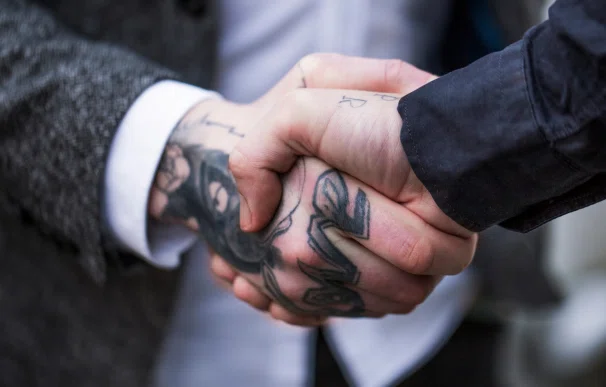Do tattoos improve self-esteem?
Interview with Caroline Gourdier, the tattooed psychologist
06 May 2024
They get tattooed for different reasons: To reflect their love for art, because they feel identified and represented with certain drawings or figures, to cover and resignify a wound or to immortalize moments and people.
But, do tattoos improve self-esteem?
We find it extremely important to answer and understand this question, not only from an intimate and personal perspective, but also from the other’s perspective, since external opinion can influence previous decisions and the perception of oneself.
This time, Caroline, "the tattooed psychologist", will tell us about this topic as well as she did when we talked about Tattoos as a form of therapy and expression.

Caroline is a graduate psychologist from the Autonomous University of Barcelona, born in France, currently living in Spain.
She is interested in the most integrative currents of psychology, which do not focus only on illness or disorders, to take psychology as a tool for well-being and positivity.
So, let's get fully into this interesting topic.
Tattoos as a method to improve self-esteem
Having a good self-esteem is essential for any human being, since this is equivalent to feeling good about oneself.
Self-esteem helps us to have a healthy relationship with our mind and, of course, also with our environment because, as you can imagine, everything begins with us, within us, and if there is no fruitful work, it will be reflected in the rest of our life.
Anything that lifts our spirits is a grain of sand for our self-esteem, which is why we will include tattoos in this category, but… Is it really like that? Can tattoos help boost self-esteem?
Let's see what Caroline has to say about it.
“Yes, it is totally true. A tattoo is a decision for life, and you have to be very sure and trust your choice: your design, your tattoo artist, etc. It is a way of self-affirmation, in front of others and the rest of the world. Through the tattoo, you affirm your personality, your convictions, your values, your roots, etc. It is a way of differentiating oneself from others as a strength. As much as tattoos are becoming more and more common, each tattoo is unique, like all of us”
People's self-esteem can be destroyed by many factors, a very recurring one is usually physical appearance.
If our body generates insecurities and complexes, the first thing we will do is look for a solution to accept that characteristic that we reject.

In this sense, tattoos are seen as a way of "tuning up", in order to feel better and look more attractive. We asked Caroline, is this true?
“Yes, indeed in some cases it is so. As I said before, it is a way to affirm yourself before others and to claim your place to be seen. And in some cases, it works! But, in others, it is not enough. It's like someone who is going to have plastic surgery, thinking that it will solve all their self-confidence problems because they will have the body of their dreams.
Often, a weak self-esteem is due to a very deep wound of rejection, abandonment or humiliation... As much as you tune yourself, you are not going to solve the problem from the root... to use a metaphor, it is like when you have a cold and you take a pill to be able to be functional in your day, and your head stops hurting to work and do everything you have to do well, when your body is actually telling you to rest and stop for a moment.
It shows you a need you try to cover up because maybe you have many things to do and if you don't do them, no one else will. However, the point is that you are not acting from the root of the problem. You only seek to avoid it so that it does not bother you in your responsibilities.
But you don't listen to yourself. You are not paying attention to what your body needs. Getting tattoos, surgery or going to the gym just to be more good-looking, it's the same, in my opinion!”
Other people's gaze
A factor that greatly influences our self-perception is the gaze of other people. Consciously or unconsciously, many of our daily decisions are impregnated by our speculation about the vision of the environment.
The fact of getting a tattoo is not isolated from this reflection... Are tattoos for oneself, or are they designed for the gaze of others?
According to Caroline,
“It depends on the type of tattoo we are talking about. For small pieces, and in places that are not seen much, the tattoo may only be for the person who wears it, with a special symbolism. But, in large pieces, I think it influences more because it is something that draws attention, this is undeniable. Although I really think that the person who wears them does it for themselves, the look of the other influences his self-esteem, self-confidence, etc. It conveys a certain security and “rebelliousness”, a clear intention to break the rules and change mentalities and prejudices.”

We can’t leave aside an essential issue within the tattoo culture: the difficulty when getting a job.
Although it seems crazy, we all know this. Many people were rejected in their interviews for wearing designs on their skin, as if a disqualifying factor. This is not new, but it seems that society is changing.
“Luckily, that's changing. I have never had a problem with my tattoos, and as a psychologist, I have been able to convert them into a strength rather than a weakness, contrary to what even one of my tattoo artists told me (who told me that if I was going to be a psychologist, I would have to cover my arms - I was still a student at that time, and it seemed extremely stupid to me because if you ask the person in front of you to be transparent to establish a bond of trust, the least they can do is show themselves how they really are.
Most of my patients tell me that they chose me precisely for this reason, because I am different, and they will not feel judged unlike with a more traditional psychologist. In the end, I am convinced that, by fully trusting who I am (without having listened to teachers or tattoo artists) and my abilities as a psychologist (because like any other psychologist I have degrees, experience and studies), I was able to open my therapy to people who clearly told me they never would have gone to therapy if they hadn't found me.
I feel honoured and very grateful for having enabled these changes in mentalities and to be able to cohabit two different and incompatible worlds”
When a tattoo no longer represents us
As mentioned before, getting a tattoo can help us improve our self-esteem, but is it a double-edged sword? If we stop feeling comfortable with it, will our self-esteem be affected?
“It is a fascinating question, which emphasizes the fact that we are changing beings that evolve. And it is normal that a tattoo that we got when we were 20 years old does not represent us when we are 40. Or even from one year to the next.
I believe that this fact can be assumed positively if we take it as a memory that makes us aware that we have changed (for the better, supposedly), that we are another version today. The person who is going to feel psychological discomfort from wearing a tattoo that no longer belongs to them focuses on the negative side of the memory, on who they were in the past.
If you focus on the present and see yourself as more mature, stable, you will be looking on the positive side. This is my advice to people in this situation”
So, do tattoos improve self-esteem?
Caroline's experience has helped us understand that tattoos can support one's self-relationship, as they serve to gain security; as told by her, “to assert oneself in front of others and claim a place to be seen”. And while they will never replace therapy as a mechanism for healing, they can still be comforting in ways that are as intimate as personal.
See how your tattoos are not only art on the skin but can also contribute to the well-being of your clients?
This can even be a source of motivation; nothing nicer than helping others with our work!
So, if impacting people's lives for the better while growing as a professional sounds good, you might be interested in expanding your knowledge and adding new tools to create meaningful tattoos. And for that, we can't think of a better solution than our online professional tattoo courses.